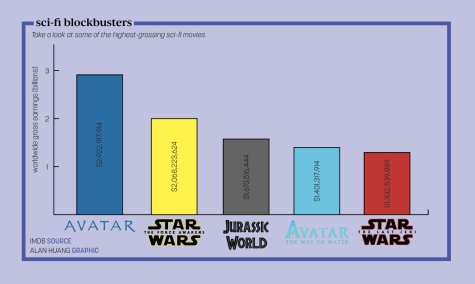The highly anticipated horror film “M3GAN” released in theaters Jan. 6. The film is centered around a programmer who creates a life-like robot designed to keep her young niece company. However, the device gets out of hand when it goes to vicious lengths to protect the niece in social situations. “M3GAN” is just the latest of many films that depict artificial intelligence, or AI, in a negative light. This comes at a time when AI’s presence in society is rapidly increasing. According to CompTIA, the forecasted annual growth rate of AI between 2020-2027 is 37%.
Some users of AI, such as AP computer science teacher Sarah Robinson, said they are skeptical of the technology due to the inherent bias of its design.
“I definitely have concerns about AI,” Robinson said. “There’s a lot of controversy around the dangers of people forming relationships with AI that aren’t really human and creating computers that mirror but don’t have the ethics of humans. A self-driving car may have to make a decision of staying on course and hitting a human, or going off the road and hitting a building. There have also been a lot of issues with AI facial recognition being racially biased. We are always at risk of the computer or machine created having the biases of the creator.”
But despite the negative press, junior Robert Nies, AI and Machine Learning Club president, said he is excited by the increase of AI and its innovative problem-solving capabilities.
“I find it fascinating when AI solves a real problem, like AlphaFold predicting protein structure, which was a major advancement in biology,” Nies said. “It is also great that these technologies are so accessible — a lot of the core AI technologies are open-sourced, so any programmer can build their own projects with them.”
Nies said he is not concerned about AI itself, but rather the implications of the exploitation of the technology by companies that only aim to gain profit.
“I am concerned by the potential for AI to be used to develop algorithms for delivering highly addictive content, such as YouTube and TikTok have achieved,” Nies said.
Computer science student and senior Ramani Satishkumar views AI in a positive light.
“I think AI has a lot of potential benefits to offer if it’s used in the right way, like the invention of the iPhone and Amazon Alexa,” Satishkumar said. “I think it’s a good thing that AI is becoming more prominent in everyday life.”

Films play a major role in influencing public perception on topics. According to the National Institute of Health, mainstream cinema heavily influences viewers’ perceptions of societal issues.
Nies said most films featuring violent AI characters are inaccurate and could distort viewers perceptions of what AI truly is.
“Most popular culture representations of AI, including ‘M3GAN’, focus on AI developing consciousness and deciding to murder people, which is clearly a negative take on AI development,” Nies said. “From an engineering perspective, this is pretty silly— making machines to kill people has already been achieved. On the other hand, expecting a mechanical system to achieve new capabilities without extensive time spent testing, redesigning and iterating is silly.”
Robinson, on the other hand, said exposure to negative depictions of AI will force the audience to develop healthy skepticism of the technology.
“I think there are many films that exist that show the harms of AI, and I think that is necessary,” Robinson said. “Of course, everyone perceives messages differently, but I think without some of this media many people would have no reason to question AI.”
Satishkumar said the positive depictions of AI outweigh the negative.
“When I think of movies involving AI, I think of ‘WALL-E’ and ‘Big Hero 6’. I think movies like this are what molded my perception of AI growing up. These movies have a positive storyline so I think they would contribute to a positive narrative of AI.”
Despite its film portrayals, Robinson said she is hopeful that the public will adapt to the increased presence of AI.
“I hope that the public will be receptive to increased AI, with also awareness of its risks,” Robinson said. “I hope that it is still challenged so that people have a clear understanding of what it really is and don’t have blind faith in it.”
For his part, Nies said he has concerns with the lack of public awareness and education about AI, which will influence its societal power.
“I hope people will keep themselves informed about the tradeoffs they are choosing with any technology— but it seems far more likely that people will accept nearly anything that makes their lives moderately more pleasurable or convenient— and fair enough,” Nies said. “Most of the time, people won’t even be able to tell; ads will get slightly better targeted and financial predictions will be slightly better.”































![What happened to theater etiquette? [opinion]](https://hilite.org/wp-content/uploads/2025/04/Entertainment-Perspective-Cover-1200x471.jpg)














































![Review: “The Immortal Soul Salvage Yard:” A criminally underrated poetry collection [MUSE]](https://hilite.org/wp-content/uploads/2025/03/71cju6TvqmL._AC_UF10001000_QL80_.jpg)
![Review: "Dog Man" is Unapologetically Chaotic [MUSE]](https://hilite.org/wp-content/uploads/2025/03/dogman-1200x700.jpg)
![Review: "Ne Zha 2": The WeChat family reunion I didn’t know I needed [MUSE]](https://hilite.org/wp-content/uploads/2025/03/unnamed-4.png)
![Review in Print: Maripaz Villar brings a delightfully unique style to the world of WEBTOON [MUSE]](https://hilite.org/wp-content/uploads/2023/12/maripazcover-1200x960.jpg)
![Review: “The Sword of Kaigen” is a masterpiece [MUSE]](https://hilite.org/wp-content/uploads/2023/11/Screenshot-2023-11-26-201051.png)
![Review: Gateron Oil Kings, great linear switches, okay price [MUSE]](https://hilite.org/wp-content/uploads/2023/11/Screenshot-2023-11-26-200553.png)
![Review: “A Haunting in Venice” is a significant improvement from other Agatha Christie adaptations [MUSE]](https://hilite.org/wp-content/uploads/2023/11/e7ee2938a6d422669771bce6d8088521.jpg)
![Review: A Thanksgiving story from elementary school, still just as interesting [MUSE]](https://hilite.org/wp-content/uploads/2023/11/Screenshot-2023-11-26-195514-987x1200.png)
![Review: "When I Fly Towards You", cute, uplifting youth drama [MUSE]](https://hilite.org/wp-content/uploads/2023/09/When-I-Fly-Towards-You-Chinese-drama.png)
![Postcards from Muse: Hawaii Travel Diary [MUSE]](https://hilite.org/wp-content/uploads/2023/09/My-project-1-1200x1200.jpg)
![Review: "Ladybug & Cat Noir: The Movie," departure from original show [MUSE]](https://hilite.org/wp-content/uploads/2023/09/Ladybug__Cat_Noir_-_The_Movie_poster.jpg)
![Review in Print: "Hidden Love" is the cute, uplifting drama everyone needs [MUSE]](https://hilite.org/wp-content/uploads/2023/09/hiddenlovecover-e1693597208225-1030x1200.png)
![Review in Print: "Heartstopper" is the heartwarming queer romance we all need [MUSE]](https://hilite.org/wp-content/uploads/2023/08/museheartstoppercover-1200x654.png)


